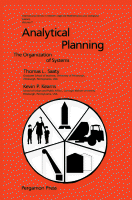Browse content
Table of contents
Actions for selected chapters
- Full text access
- Book chapterNo access
Author Index
Pages 201-203 - Book chapterNo access
Subject Index
Pages 205-208
About the book
Description
Analytical Planning: The Organization of Systems deals with systems and planning and suggests a methodological tool for integrating the two. This book presents the basic ideas behind complexity, systems, hierarchies, and prioritization and describes planning as a unique form of decision making with illustrations of some prominent philosophical and methodological approaches. It highlights some shortcomings of traditional approaches to planning and shows how these can be addressed by the systems approach. This monograph consists of seven chapters and opens with a discussion on the nature of complexity and describes an approach that facilitates the use of creativity and experience to structure complex problems. The next chapter explains the rationale for systems thinking and how reductionism works. The Analytic Hierarchy Process is then considered, along with its relationship to some of the properties of systems. The remaining chapters focus on ways of thinking about planning and philosophies of planning; strategic planning; and the applicability of the Analytic Hierarchy Process to benefit-cost analysis and resource allocation. This book is intended for managers, decision makers, and planners, as well as researchers and practitioners in applied mathematics and computer science.
Analytical Planning: The Organization of Systems deals with systems and planning and suggests a methodological tool for integrating the two. This book presents the basic ideas behind complexity, systems, hierarchies, and prioritization and describes planning as a unique form of decision making with illustrations of some prominent philosophical and methodological approaches. It highlights some shortcomings of traditional approaches to planning and shows how these can be addressed by the systems approach. This monograph consists of seven chapters and opens with a discussion on the nature of complexity and describes an approach that facilitates the use of creativity and experience to structure complex problems. The next chapter explains the rationale for systems thinking and how reductionism works. The Analytic Hierarchy Process is then considered, along with its relationship to some of the properties of systems. The remaining chapters focus on ways of thinking about planning and philosophies of planning; strategic planning; and the applicability of the Analytic Hierarchy Process to benefit-cost analysis and resource allocation. This book is intended for managers, decision makers, and planners, as well as researchers and practitioners in applied mathematics and computer science.
Details
ISBN
978-0-08-032599-6
Language
English
Published
1985
Copyright
Copyright © 1985 Elsevier Ltd. All rights reserved.
Imprint
Pergamon
